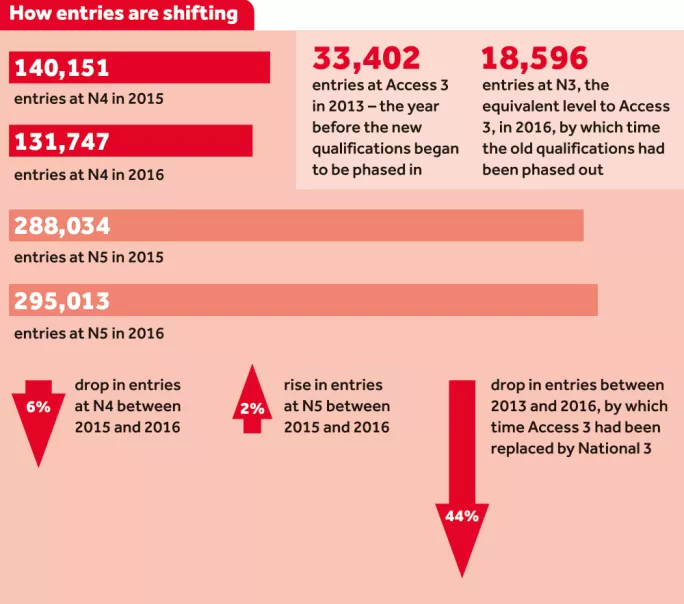Exam pressure is leading to ‘some dodgy practices’

When the new president of the Scottish Secondary Teachers’ Association (SSTA) first entered teaching, he was told to tone down his strong Glaswegian accent.
But Kevin Campbell believes his working-class roots - and the way he speaks - are vital for connecting with disadvantaged pupils.
It does not take Campbell, who took on his new role last month, long to tell you he was born and raised in Easterhouse in Glasgow. He makes no bones about it; he is proud of where he comes from and of working as a biology teacher at Levenmouth Academy in Fife, which serves a highly deprived area.
After qualifying as a teacher in 2003 at the age of 27, Campbell, who is now 42, spent a brief period working at Cleveden Academy in Glasgow’s west end, where he recalls being summoned by the headteacher on four occasions and told to tone down his accent.
But Campbell insists that speaking “la-di-da” is not the way to engage with disadvantaged pupils. He says: “Working-class kids are always going to identify more with, and therefore listen to, a teacher who quite obviously comes from the same place in society as they do.”
‘Nobody can fail’
He says he loves his job, but worries that teachers are facing huge pressure to get pupils through qualifications. There is a perception among school leaders that N4 is easy, and an assumption that everyone should pass - meaning pupils who should be doing N3 are being presented at N4, leading to “some pretty dodgy practices in schools”, he warns.
Campbell gives the examples of pupils taking tests repeatedly until they pass them, and teachers passing pupils who are performing below the relevant levels.
He asks: “Where are all those kids who were doing Access 3? They are all being forced into National 4 classes and pressure is being brought to bear on teachers to just pass them.”
In 2013 - the last year that the old qualifications ran before the new Nationals were phased in - there were 33,402 entries at Access 3. But in 2016, there were just 18,596 entries at N3, the equivalent level.
Exam body the Scottish Qualifications Authority (SQA) has criticised schools for presenting pupils at the wrong level, but the focus has been on the increase in entries at N5, to the detriment of internally assessed N4 (see box).
Campbell says: “There is the constant pressure, ‘nobody can fail, nobody can fail, nobody can fail’ [at N4] and they are put back until you get them through that, and I think that leads to some pretty dodgy practices in schools.”
An SQA spokesman disputes Campbell’s claims about the effects of exam pressure, saying the body relies “on the professionalism of teachers, as schools and colleges undertake their own internal verification processes”.
The spokesman adds that the SQA offers a range of support for schools, including an internal verification toolkit, help to understand standards, events and resource materials, as well as processes to quality-assure the internal assessment of schools.
Jim Thewliss, general secretary of secondary school leaders association the SLS, says decisions about which qualifications to put pupils forward for are generally made at the classroom or departmental level, and headteachers are not in the business of “putting unfair or unrealistic pressure” on pupils to get a result.
While Campbell wishes to use his role to highlight the high-stakes accountability being placed on teachers, he is also happy to give the government credit where he feels it is due. For example, he welcomes the government’s bid to close the attainment gap between advantaged and disadvantaged pupils; his school, one of the largest in Scotland, has benefited from £302,400 in pupil equity funding (PEF) this year.
He says that he is proud of working in an area where many pupils come from disadvantaged backgrounds. “The kids in the likes of [leafy suburbs] Milngavie and Bearsden don’t need me,” he states.
“They have already got the skills through their upbringing to go on and succeed.”
Excluded for truanting
Campbell’s father was a postman and his mother worked in a Co-op. By S5, he had lost interest in school and was “kicked out” for truanting with no qualifications.
He went on to work at a timber yard, a sheet metal warehouse and a supermarket - and “thoroughly detested it all”.
He got into teaching via an HNC, a degree from Caledonian University and a teaching qualification from Keele University.
His role, he says, is not to just get kids through exams, but to turn out “decent human beings”. But he is also eager to stress that school budgets need a significant additional boost.
On the face of things, Levenmouth Academy is better resourced than many schools: as well as walking away with a large swathe of PEF money, it has been blessed with a state-of-the-art building after opening its doors for the first time in August.
But the day-to-day reality is a lack of teachers and support staff, and “zilch” resources, according to Campbell.
“In science, we have no money for equipment, so we are in state-of-the-art labs but we are using physics and chemistry equipment from the 1980s and 70s. That is the reality for me as a teacher,” he says.
Campbell is looking forward to using his presidency to raise these issues - and many more - at a national level.

Register with Tes and you can read two free articles every month plus you'll have access to our range of award-winning newsletters.
Keep reading with our special offer!
You’ve reached your limit of free articles this month.
- Unlimited access to all Tes magazine content
- Save your favourite articles and gift them to your colleagues
- Exclusive subscriber-only stories
- Over 200,000 archived articles
- Unlimited access to all Tes magazine content
- Save your favourite articles and gift them to your colleagues
- Exclusive subscriber-only stories
- Over 200,000 archived articles